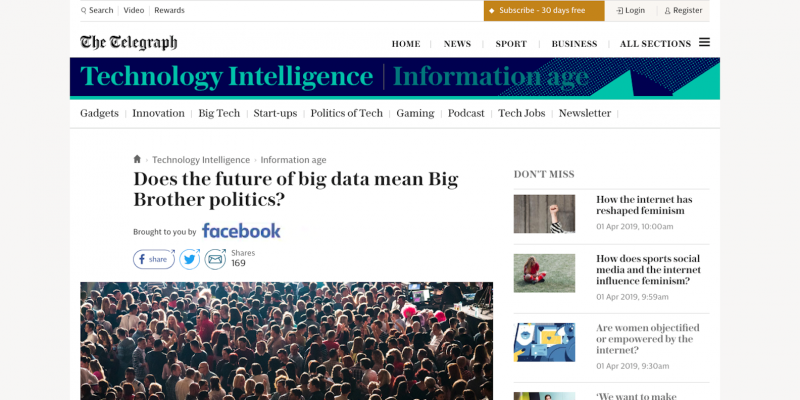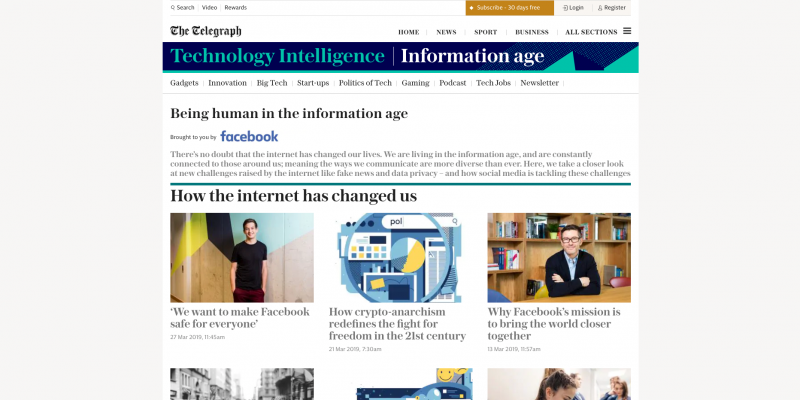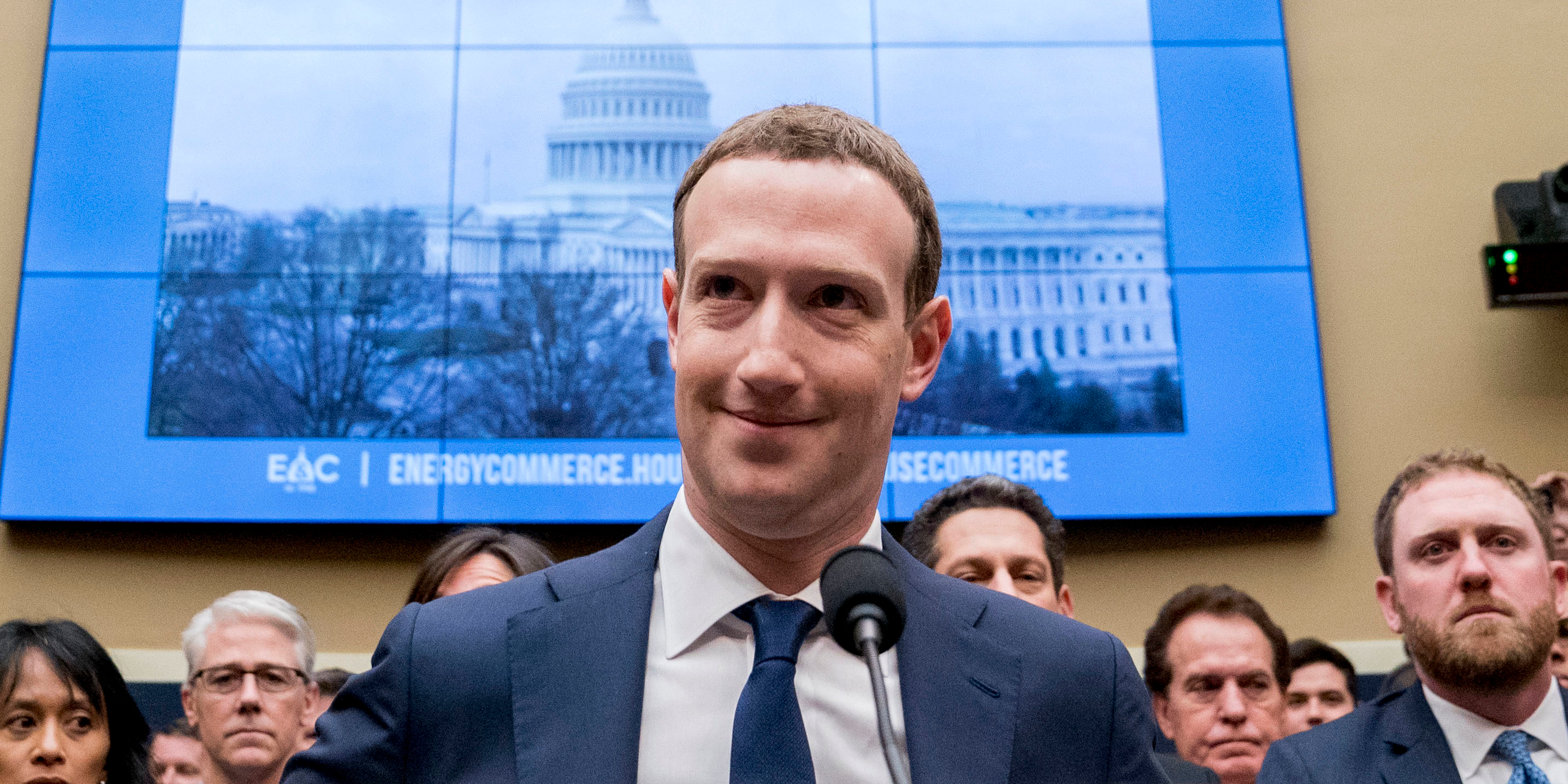- Facebook is paying The Daily Telegraph to run a series of positive sponsored stories about it.
- The British newspaper is running dozens of stories that defend Facebook on controversial subjects like terrorism, hate speech, and cyber-bullying.
- It shows how Facebook is attempting to sidestep the often-critical media by buying positive coverage of itself.
- A spokesperson said it is part of a UK marketing campaign to drive “awareness” of Facebook’s investments “that have a positive impact on people’s lives.”
Facebook has found a novel solution to the never-ending deluge of negative headlines and news articles criticizing the company: Simply paying a British newspaper to run laudatory stories about it.
Facebook has partnered with The Daily Telegraph, a broadsheet British newspaper, to run a series of features about the company, Business Insider has found – including stories that defend it on hot-button issues it has been criticised over like terrorist content, online safety, cyberbullying, fake accounts, and hate speech.
The series – called “Being human in the information age” – has published 26 stories over the last month, to run in print and online, and is produced by Telegraph Spark, the newspaper’s sponsored content unit.
“Fake news, cyberbullying, artificial intelligence – it seems like life in the internet age can be a scary place,” the articles say. “That’s why Telegraph Spark and Facebook have teamed up to show how Facebook and other social media platforms are harnessing the power of the internet to protect your personal data.”
Sponsored native content, in which companies pay for media organizations to produce positive articles that appear similar to traditional news stories, are an increasingly popular method of monetization for many publications, including Business Insider. Some studies have been critical of the ad format, arguing they can mislead news consumers.
Facebook's recent use of the format highlights how in its attempts to burnish its image after years of damaging scandals, the company is exploring ways to sidestep the critical media ecosystem entirely and get out a positive, unadulterated message about itself.
In an email, Facebook spokesperson Vicky Gomes said that "this is a part of our larger marketing efforts in the UK with the goal of educating and driving awareness of our local investments, initiatives, and partnerships here in the UK that have a positive impact on people's lives."
"As part of this campaign, we've partnered with the Telegraph and there will be some profiles of London-based employees working on some of the toughest issues to keep our platform safe, as well as articles to educate people on topics like how to spot fake news and how to adjust their privacy settings," Gomes said.

The stories dismiss 'technofears' about the impact of technology on society
On March 13, the series ran a feature headlined "What action is Facebook taking to tackle terrorist content?", which discussed Facebook's work to "ensure terrorist content is identified and removed as swiftly as possible."
Two days later, a gunman opened fire at mosques in Christchurch, New Zealand, killing 50 people and livestreaming the entire attack on Facebook.
"The same week of the Christchurch attack, @Facebook told us in a sponsored puff piece in the @Telegraph that they have terrorist content under control," the European branch of policy organization Counter Extremism Project tweeted at the time. "This week, the picture looks very different."
The subjects of the sponsored stories in The Daily Telegraph, an influential, 150-year-old right-leaning daily newspaper, that ran throughout March included everything from artificial intelligence to female objectification and combatting scammers online - as well as issues that the company has been criticized for.
"Tackling hate speech and terrorism on social media" talks approvingly of Facebook and other social network's attempts to crack down on extremist content, but doesn't go into detail about efforts to tackle white supremacist content on Facebook, over which the company has been heavily criticized. On Tuesday, the Huffington Post reported that Facebook refused to take down a video that attacked Jews and promoted white nationalist talking points, despite the company's new rules banning white nationalism.
"How to deal with cyberbullying" provides guidance for children who have been harassed and bullied online - an issue that Facebook-owned photo-sharing app Instagram has been scrutinized over, including in an investigation by The Atlantic.
And another, "Why have technofears dominated history?," written by well-known author and geneticist Adam Rutherford, dismisses broadly skeptical attitudes towards technology, including the growing argument that screen-time can adversely affect children's' development:
"This is an important discussion: does screen-time actually cause harm? It's an area scientists might term 'opinion rich, data poor'. Intuitively, it may feel that kids glued to their phones or wired into a PlayStation 4 causes more harm than good. But science is here to distinguish what we feel from what is true. And the truth is that there is very little evidence to suggest that screen-time is a significant factor in real social and personal issues, including wellbeing, depression and violence.
...
"We are a technological species, and always have been. Maybe the speed of change feels overwhelming, and what is normal to our children is scary for us. But that is the same as it ever was. There may well be qualitative differences in what being online can now offer us in benefits or subterfuge, but we will only progress if we engage with the ever-changing yet ultimately unvarying relationship we have with technology."
A different column, by neuroscientist Dr. Dean Burnett ("Has the biggest danger of the internet been left unchecked?"), suggests the biggest problem facing the internet is that it "makes it easier than ever to find people to agree with you."

Facebook's go-to talking points are all here
Facebook has also produced interviews with some of its European employees as part of the series.
There's one with Steve Hatch, VP of Northern Europe, that's headlined "Why Facebook's mission is to bring the world closer together." Hatch's remarks are largely familiar company talking points - "With a platform of more than 2.2 billion, we have a big responsibility," " "let me say that we never sell people's data," "we've learned that people don't necessarily dislike advertisements per se, just ads that aren't relevant and waste their time," and so on.
And in "'We want to make Facebook safe for everyone,'" product manager Tim Matthews emphasizes Facebook's growth on its "safety and security" team. "We're taking serious measures to get this right. In the past year alone we have more than doubled our safety and security team to 30,000 and invested significantly in cutting-edge technology to help us remove abusive content quicker," he is quoted as saying.
Other articles talk about Facebook's charitable giving efforts ("How donating on Facebook has transformed fundraising"), a column from former Olympic swimmer Mark Foster about the need for online behavior classes for school kids ("Does freedom of expression online need a code of conduct?"), and a short feature by author Wendy McElroy about internet crypto-libertarianism ("How crypto-anarchism redefines the fight for freedom in the 21st century").
It's not clear how much Facebook is paying The Daily Telegraph for the articles, or who comes up with the initial story ideas. A Facebook spokesperson did not answer further questions about the partnership. The Daily Telegraph did not respond to Business Insider's request for comment.
Facebook has paid for sponsored content with British newspapers before - but on far less politically charged issues. In 2016 and 2017, it ran a number of stories in left-leaning The Guardian on subjects like growing your business with video, understanding customers, and case studies of succesful companies. The Guardian articles are now offline, but remain accessible via the Internet Archive.
Do you work at Facebook? Contact this reporter via encrypted messaging app Signal at +1 (650) 636-6268 using a non-work phone, email at [email protected], Telegram or WeChat at robaeprice, or Twitter DM at @robaeprice. (PR pitches by email only, please.) You can also contact Business Insider securely via SecureDrop.
Read more:
- Car-bomb fears and stolen prototypes: Inside Facebook's efforts to protect its 80,000 workers around the globe
- Facebook quietly killed its Building 8 skunkworks unit as it reshuffles its cutting-edge experiments and hardware
- Leaked Andreessen Horowitz data reveals how much Silicon Valley startup execs really get paid, from CEOs to Sales VPs

